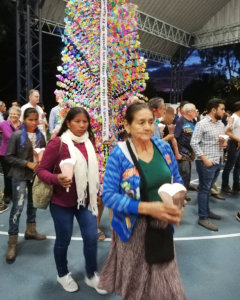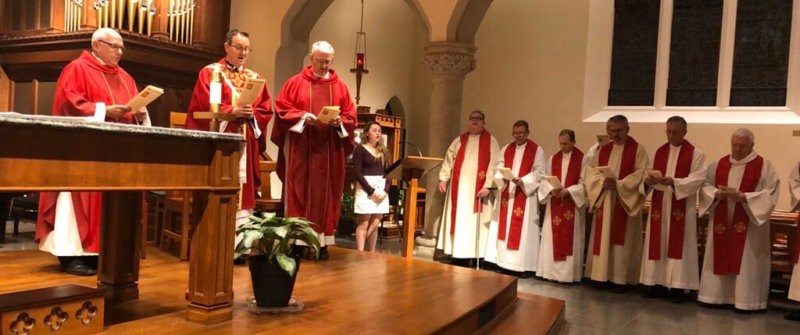WASHINGTON (CNS) — Around the world, communities of their Jesuit brothers, but also laity involved in social justice circles and even Pope Francis, made sure their names and what they stood for was not forgotten.

“Their names are a litany,” Canadian Cardinal Michael Czerny tweeted Nov. 16, referring to the 1989 assassination of his Jesuit brothers Fathers Ignacio Ellacuria, Segundo Montes, Ignacio Martin Baro, Amando Lopez, Joaquin Lopez y Lopez and Juan Ramon Moreno, along with a Salvadoran woman and her teenage daughter.
“My six Jesuits brothers, and Elba Julia Ramos, Celina Ramos, along with Rutilio Grande S.J. and St. Oscar Romero, I often think of them, who dreamed of a vibrant church committed to accompany the excluded and all those whom this unjust world discards,” tweeted Cardinal Czerny, undersecretary of the Section for Migrants and Refugees of the Vatican Dicastery for Promoting Integral Human Development.
He traveled to El Salvador with thousands of others and participated at events remembering the men and the Salvadoran women. The events included the attendance of U.S. Congressman Jim McGovern of Massachusetts, who knew three of the slain Jesuits, as well as Spain’s Secretary of State for International Cooperation Juan Pablo de La Iglesia y Gonzalez de Peredo.
Cardinal Czerny participated in several events, but his words on Twitter were just a few among countless tributes that recalled the work of the slain Jesuits 30 years after their assassination on the grounds of the Central American University in San Salvador, where they taught, lived and were fatally shot and left face down in a garden.
Pope Francis mentioned their deaths Nov. 7 in a speech to participants of an international congress of the Jesuits’ Social Justice and Ecology Secretariat, mentioning how some members had given “life to the end.”
“This year we celebrate the 30th anniversary of the martyrdom of the Jesuits of the Central American University of El Salvador, which caused so much pain to Father (Peter Hans) Kolvenbach and which led him to seek the help of Jesuits throughout the Society (of Jesus). Many responded generously. The life and death of the martyrs is an encouragement to our service to the least ones.”
Jesuit Father Kolvenbach was the superior general of the order when the men and their Salvadoran companions were assassinated. Cardinal Czerny, then a priest, took over the position of one his murdered spiritual brothers, becoming the director of the Human Rights Institute at the UCA, as the university is known.
It was a precarious spot to assume.
“Why were the Jesuits killed? They were playing an important role in the commitment to justice and human rights and wanted to broker a negotiated (peace) solution in the country and that’s what cost them their lives,” said Bishop Oswaldo Escobar Aguilar of Chalatenango, El Salvador, in a Nov. 8 session during a visit with Georgetown University students at the Center for Social Justice in Washington. “But the economically powerful sector in the country wouldn’t permit the progression of these negotiations.”
A negotiated solution wouldn’t have benefited them economically, nor in terms of governmental power, he said. So, what happened is that they were labeled communists and plans began to take place to have them executed. Those plans were carried out Nov. 16, 1989, and symbolically the murderers aimed for the Jesuits’ brains.
“It was a heinous crime,” Bishop Escobar said.
Those stepping into their shoes, as then-Father Czerny did, were putting a target on themselves. But the international outcry over the killings was one of the factors that led negotiations to take place, said Bishop Escobar.
On Nov. 17, at Washington’s Dahlgren Chapel on the Georgetown campus, the Jesuit community donned red, signifying martyrdom, and marked the anniversary with a Mass.
“So many of us, we’re still very deeply disturbed, and I think profoundly inspired by the assassination of our Jesuit brothers at the University of Central America there in San Salvador. And this anniversary, it brings it all back to our consciousness as it does every year on November 16th,” said Jesuit Father Jerry Hayes in his homily.
“Our brothers were brutally and symbolically murdered, killed because they were doing what their Jesuit vocation called them to do. As priests and professors, they were promoting a faith that does justice,” he said. “They were speaking out on behalf of those who had no voice and those who lived daily in fear.”
Because they challenged the power and the wealth of a few on behalf of those who were tragically deprived of basic human rights, they had to be eliminated, Father Hayes continued.
“They had to been taken down in a way which would be a threatening sign to others,” he said. “Repression must resort to violence in order to sustain itself.”
He said the murder of the Jesuits must lead Catholics to ask: Am I doing enough?
“Is my heart is truly with those who are oppressed and marginalized? Those in my own neighborhood, in my city, my country, my community in the world that we live in?” he said. “If nobody in power is upset with me, I have to ask myself, am I doing enough?”
The death of Jesuits must inspire Catholics to stand on the side of the poor and marginalized, which is what the Gospel and Jesus asks of Christians and which the slain Jesuits carried out, he said.
“I think our Gospel this evening asks if we are doing it, and if our voice is loud enough and Jesus tells us not to worry about preparing some sort of defense when we’re seized and persecuted because of him. Because his words and his wisdom will be written on our hearts and proclaimed to those who torture and bully us,” he said.
Cardinal Czerny, in a post published on the anniversary of the men’s deaths this year said only the foolish would see their killing as a “disaster.”
“Martyrs are martyred not by chance, not because a furious tyrant suddenly decides in his madness to put an end to their lives,” he wrote in a blog called igNation. “They are martyrs above all because of the radical way in which they live their lives in the service of the Lord and his church. Martyrdom is the grace with which God seals and accepts a whole life of often ordinary, hidden commitment, service, and transforms it into the root meaning of the word ‘martyr’: witness.”
Copyright ©2019 Catholic News Service/U.S. Conference of Catholic Bishops.


